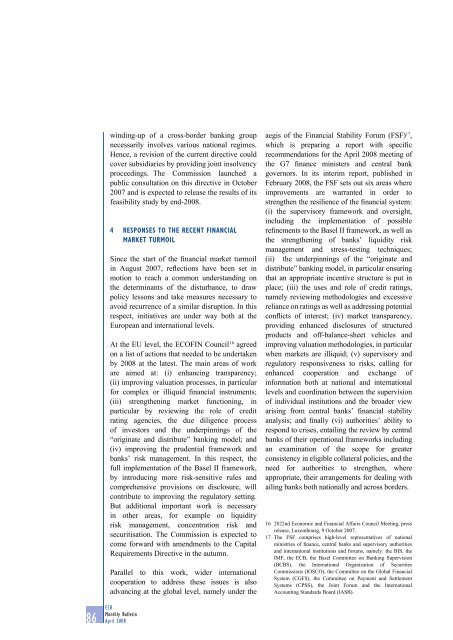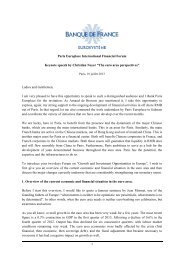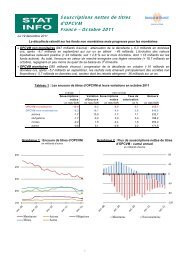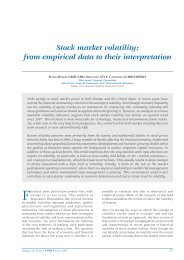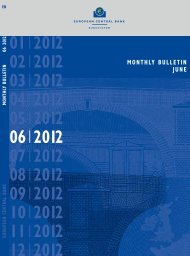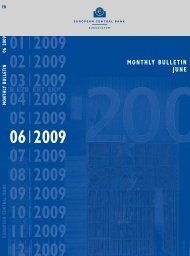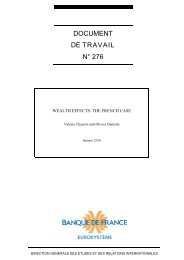Monthly Bulletin April 2008 - European Central Bank - Europa
Monthly Bulletin April 2008 - European Central Bank - Europa
Monthly Bulletin April 2008 - European Central Bank - Europa
You also want an ePaper? Increase the reach of your titles
YUMPU automatically turns print PDFs into web optimized ePapers that Google loves.
winding-up of a cross-border banking group<br />
necessarily involves various national regimes.<br />
Hence, a revision of the current directive could<br />
cover subsidiaries by providing joint insolvency<br />
proceedings. The Commission launched a<br />
public consultation on this directive in October<br />
2007 and is expected to release the results of its<br />
feasibility study by end-<strong>2008</strong>.<br />
4 RESPONSES TO THE RECENT FINANCIAL<br />
MARKET TURMOIL<br />
Since the start of the financial market turmoil<br />
in August 2007, reflections have been set in<br />
motion to reach a common understanding on<br />
the determinants of the disturbance, to draw<br />
policy lessons and take measures necessary to<br />
avoid recurrence of a similar disruption. In this<br />
respect, initiatives are under way both at the<br />
<strong>European</strong> and international levels.<br />
At the EU level, the ECOFIN Council 16 agreed<br />
on a list of actions that needed to be undertaken<br />
by <strong>2008</strong> at the latest. The main areas of work<br />
are aimed at: (i) enhancing transparency;<br />
(ii) improving valuation processes, in particular<br />
for complex or illiquid financial instruments;<br />
(iii) strengthening market functioning, in<br />
particular by reviewing the role of credit<br />
rating agencies, the due diligence process<br />
of investors and the underpinnings of the<br />
“originate and distribute” banking model; and<br />
(iv) improving the prudential framework and<br />
banks’ risk management. In this respect, the<br />
full implementation of the Basel II framework,<br />
by introducing more risk-sensitive rules and<br />
comprehensive provisions on disclosure, will<br />
contribute to improving the regulatory setting.<br />
But additional important work is necessary<br />
in other areas, for example on liquidity<br />
risk management, concentration risk and<br />
securitisation. The Commission is expected to<br />
come forward with amendments to the Capital<br />
Requirements Directive in the autumn.<br />
Parallel to this work, wider international<br />
cooperation to address these issues is also<br />
advancing at the global level, namely under the<br />
aegis of the Financial Stability Forum (FSF) 17 ,<br />
which is preparing a report with specific<br />
recommendations for the <strong>April</strong> <strong>2008</strong> meeting of<br />
the G7 finance ministers and central bank<br />
governors. In its interim report, published in<br />
February <strong>2008</strong>, the FSF sets out six areas where<br />
improvements are warranted in order to<br />
strengthen the resilience of the financial system:<br />
(i) the supervisory framework and oversight,<br />
including the implementation of possible<br />
refinements to the Basel II framework, as well as<br />
the strengthening of banks’ liquidity risk<br />
management and stress-testing techniques;<br />
(ii) the underpinnings of the “originate and<br />
distribute” banking model, in particular ensuring<br />
that an appropriate incentive structure is put in<br />
place; (iii) the uses and role of credit ratings,<br />
namely reviewing methodologies and excessive<br />
reliance on ratings as well as addressing potential<br />
conflicts of interest; (iv) market transparency,<br />
providing enhanced disclosures of structured<br />
products and off-balance-sheet vehicles and<br />
improving valuation methodologies, in particular<br />
when markets are illiquid; (v) supervisory and<br />
regulatory responsiveness to risks, calling for<br />
enhanced cooperation and exchange of<br />
information both at national and international<br />
levels and coordination between the supervision<br />
of individual institutions and the broader view<br />
arising from central banks’ financial stability<br />
analysis; and finally (vi) authorities’ ability to<br />
respond to crises, entailing the review by central<br />
banks of their operational frameworks including<br />
an examination of the scope for greater<br />
consistency in eligible collateral policies, and the<br />
need for authorities to strengthen, where<br />
appropriate, their arrangements for dealing with<br />
ailing banks both nationally and across borders.<br />
16 2822nd Economic and Financial Affairs Council Meeting, press<br />
release, Luxembourg, 9 October 2007.<br />
17 The FSF comprises high-level representatives of national<br />
ministries of finance, central banks and supervisory authorities<br />
and international institutions and forums, namely: the BIS, the<br />
IMF, the ECB, the Basel Committee on <strong>Bank</strong>ing Supervision<br />
(BCBS), the International Organization of Securities<br />
Commissions (IOSCO), the Committee on the Global Financial<br />
System (CGFS), the Committee on Payment and Settlement<br />
Systems (CPSS), the Joint Forum and the International<br />
Accounting Standards Board (IASB).<br />
86 ECB<br />
<strong>Monthly</strong> <strong>Bulletin</strong><br />
<strong>April</strong> <strong>2008</strong>


